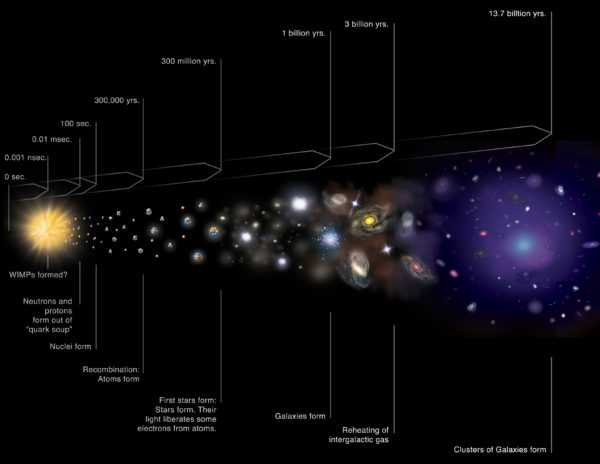"Science cannot tell theology how to construct a doctrine of creation, but you can't construct a doctrine of creation without taking account of the age of the universe and the evolutionary character of cosmic history." -John Polkinghorne
What is the Universe? What are those points of light in the night sky? Are there other Suns like our own? Do they have worlds around them? What of the larger structures; what are the spirals and ellipticals out there? How far away are they? And how old is the Universe? And finally, how did it all come to be the way it is today, and how do we know?
These used to be questions for philosophers, poets, and theologians, but for thousands of years, all we got were stories, not answers. Yet in the past 200 years, the enterprise of science has brought us not only the answers to these, but has brought up new questions to ponder, many of which we're on the verge of answering as well. For those of you who aren't in the pacific northwest and can't come to one of my talks, this article is the next best thing to hearing me speak!



However you do have to take as a postulate that god does not intervene directly in the current natural world. If you allow an active omnipotent god to intervene in todays world, then essentially anything goes, because if you allow such intervention god can do whatever god wants.
My suspicion is that lots of folks would not be comfortable with the god not intervening idea and would say that god does directly intervene.
Indeed you could then come up with a theory where god is intervening in such a way that his tracks are well covered.
@lyle #1: This is just a variant on Cartesian dualism. See, for example, https://en.wikipedia.org/wiki/Meditations_on_First_Philosophy.
No not really. That is a reasonable conclusion of empirical induction as used on Earth, not a postulate of it. We don't need to assume it, IOW - we can ask the question of whether anything goes or not. Whether the data we collect is more consistent with 'anything goes' or 'not anything' goes. We pretty quickly decide that the data is more consistent with the latter.
Sure you can, but at that point (a) you're no longer doing science, because you've set out to make your idea immune to testing, and (b) you've posited a somewhat stale limited deism to boot. Sagan's dragon in the garage is not what most theologians work to defend.
@lyle
As far as I see it, "god" as such, given in any action is a postulate just the same.
Put forth an example of the activity that fits your model i.e. an event which you feel is caused by gods active involvment, and then we look and find out what caused it.
nature doesn't really care what people or individuals feel comfortable with :)
FTFY. It's apropos of nothing but perhaps turtles.
"However you do have to take as a postulate that god does not intervene directly in the current natural world. "
And the most credible reason for having no effect is that it doesn't exist.